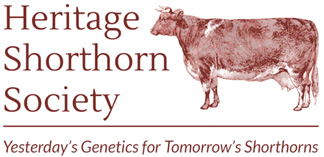
Rules and Guidelines For Registration of Shorthorns In The Heritage Shorthorn Society
There are two types of registration papers that can be obtained from the Heritage Shorthorn Society (HSS): Heritage Papers, and Heritage Influenced Papers. All cattle to be registered in HSS must be purebred Shorthorns and meet the qualifying standards for Heritage or Heritage Influenced Shorthorns. All animals to be registered must be red, red & white, white, or roan. No other color or color patterns will be accepted. Any Shorthorn can be registered with HSS as long as their parents have valid registration papers from HSS, ASA, or AMSS
Only members of HSS in good standing are eligible to register Shorthorns in the Heritage Shorthorn Society Registry.
Registration Paper Types and Qualifications
Heritage Shorthorn Registration Papers will be Red and Heritage-Influenced Registration Papers will be Blue. All registration papers will be 4 generations and each generation will show either Heritage Shorthorn or Heritage-Influenced for each generation.
Tier 1: Heritage Registration Papers
Designation HS: These will be Red Papers
Heritage Registration Papers are available only for Shorthorns which have parents that have been Verified Heritage by HSS, Certified Native by the American Milking Shorthorn Society (AMSS), or which are eligible for verification via a pedigree which traces both dam and sire to the 1822 Coates Herd Book, without the introduction of any non-verified bloodlines. They must be 100% full blood Shorthorns.
If an animal is not already Verified/Certified as Heritage/Native, any breeder can apply for Heritage Verification using registration papers from the American Shorthorn Association (ASA) or the American Milking Shorthorn Society (AMSS). Once Verified Heritage status is obtained through HSS pedigree analysis then an HSS member can apply for a Heritage Registration Paper.
When registering ET/IVF calves a copy of the “Certificate of Oocyte Recovery” must accompany the registration application. If embryos were purchased then a copy of the transfer certificate must also accompany the registration application.
Tier 2: Heritage Influenced Registration Papers
Designation HI: These will be Blue Papers
Any purebred Shorthorn with a pedigree that is at least 25% Heritage can obtain Heritage Influenced Registration Papers. Examples include one parent, one grandparent, or two great grandparents that are recognized Heritage by HSS. HSS will not consider Heritage status further back in a pedigree than great grandparents to determine Heritage Influenced status. The sire and dam must have valid Shorthorn Registration Papers from HSS, ASA, or AMSS. The sire and dam of the registration applicant do not have to be registered with the same Shorthorn Registry.
When registering ET/IVF calves a copy of the “Certificate of Oocyte Recovery” must accompany the registration application. If embryos were purchased then a copy of the transfer certificate must also accompany the registration application.
Identification of Animals
Several methods of identification can be used when registering an animal, and all applicable ID information will be included on the Registration Certificate. Acceptable ID methods include the following:
- Ear Tattoo
- Herd Tag Number
- RFID/EID Tag
- State Metal Tag (Brucellosis Tag) number
- Canadian Identification that is a tamper proof ear tag.
DNA testing Policies
DNA testing should be done through Neogen, however DNA testing from other nationally recognized genetic testing laboratories will be accepted if a copy of the test results is provided to the HSS Registry. Preference is for all testing to go through the HSS Registry with the information going both to the HSS Registry and to the owner. The DNA testing results belong to the owner of the animal not HSS but HSS Registry reserves the right to retain and use the data within the HSS Registry.
Artificial Insemination Bulls
All bulls that are to be used for artificial insemination must have a DNA Parentage Profile on file with HSS or show proof that the sire has been approved for artificial insemination at the American Shorthorn Association or the American Milking Shorthorn Society. The exception is that bulls born prior to 1980 are not required to have DNA Parentage testing.
Donor Cows For ET/IVF Embryo Production
All Donor Cows must have a DNA Parentage Profile on file with HSS Registry or show proof that the Donor Cow has been previously qualified as a Donor Cow at the American Shorthorn Association or the American Milking Shorthorn Society.
When embryos are sold, a copy of the “Certificate of Oocyte/Embryo Recovery” must be sent to the HSS Registry so that it can be recorded.
Genetic Defect Testing
The current list of known genetic defects in Shorthorns include: Tibial Hemimelia (TH), Pulmonary Hypoplasia with Anasarca (PHA), Digital Subluxation (DS), and Myostatin/Double Muscling (MYO). While genetic defect testing is not required for registration, HSS believes that all breeders should purchase Shorthorns which are not carriers for these defects. HSS encourages all Shorthorn owners to have their cattle tested for the various genetic defects if they have not done so previously. HSS Registration Papers have a section where this information can be recorded. If the genetic defect status of an animal is known that information should be reported to HSS so that it can be included on the Registration Paper.
Milk Protein Testing
If an animal has been tested for milk proteins (A2, kappa casein, beta casein, or beta lactoglobulin) this information should be reported so that it can be included on the registration paper.
Rule Changes
All rules are subject to change at the discretion of the Heritage Shorthorn Society, and they can be amended as needed to provide benefits to HSS members and to the Heritage Shorthorn Registry.